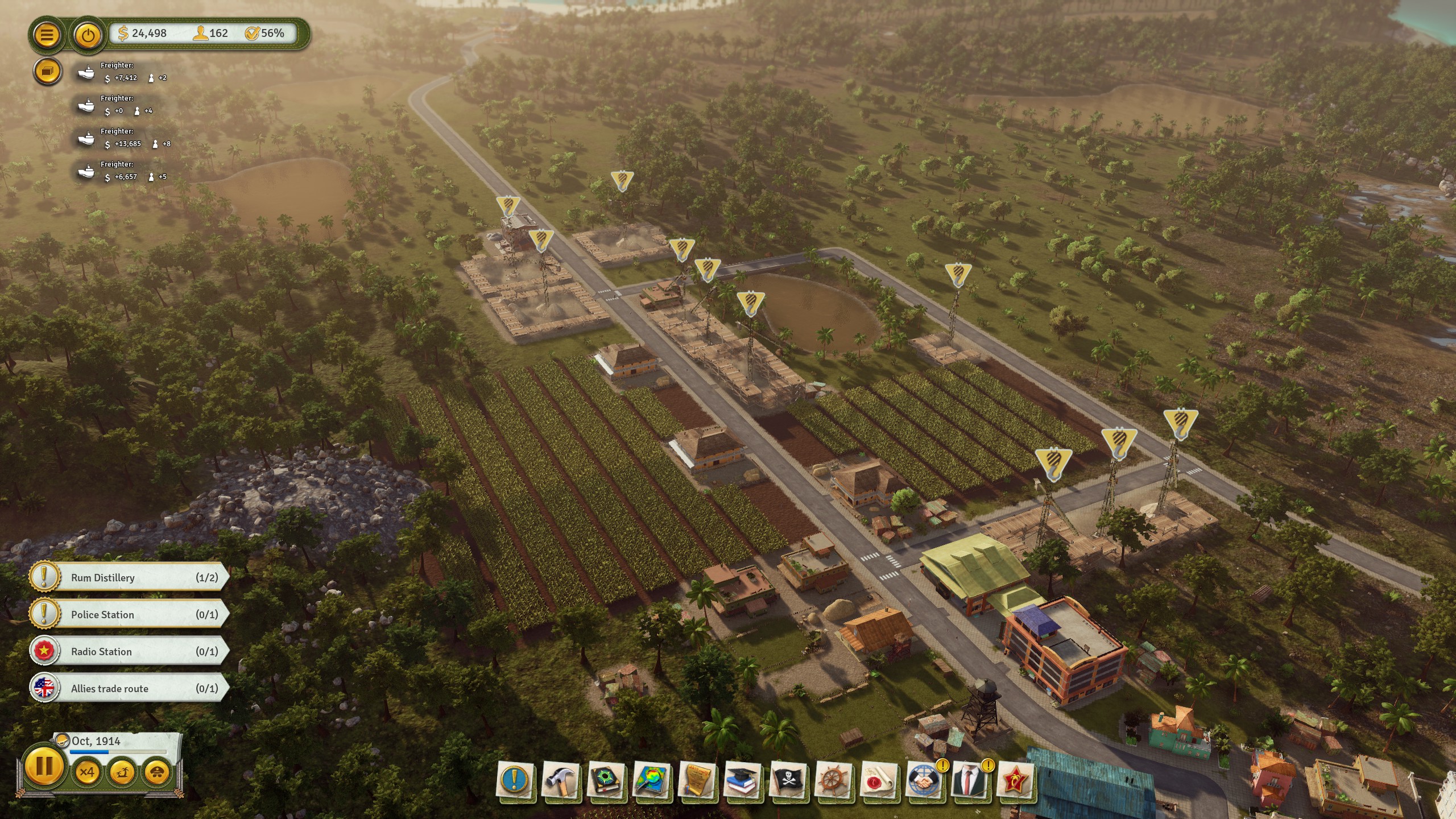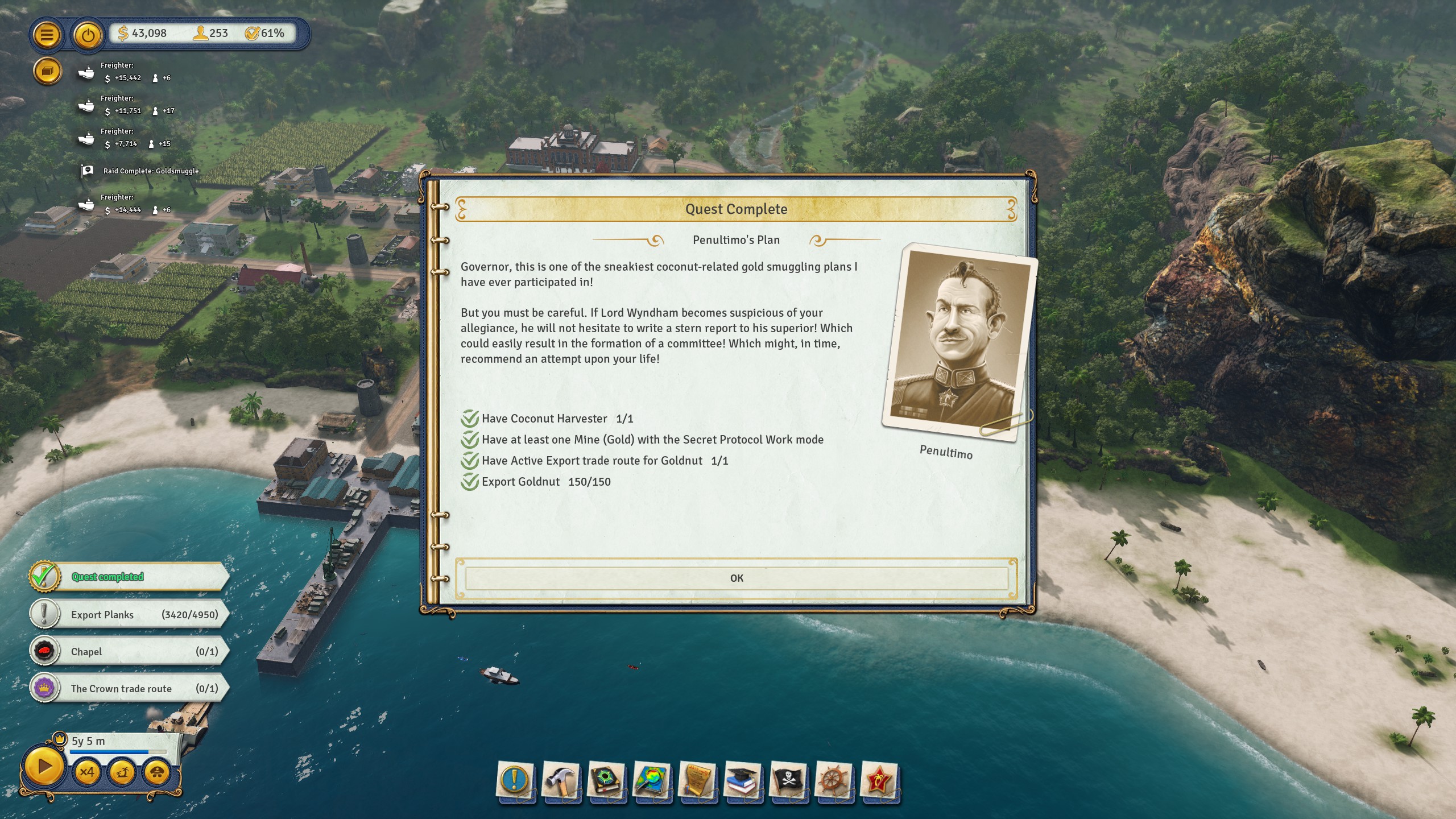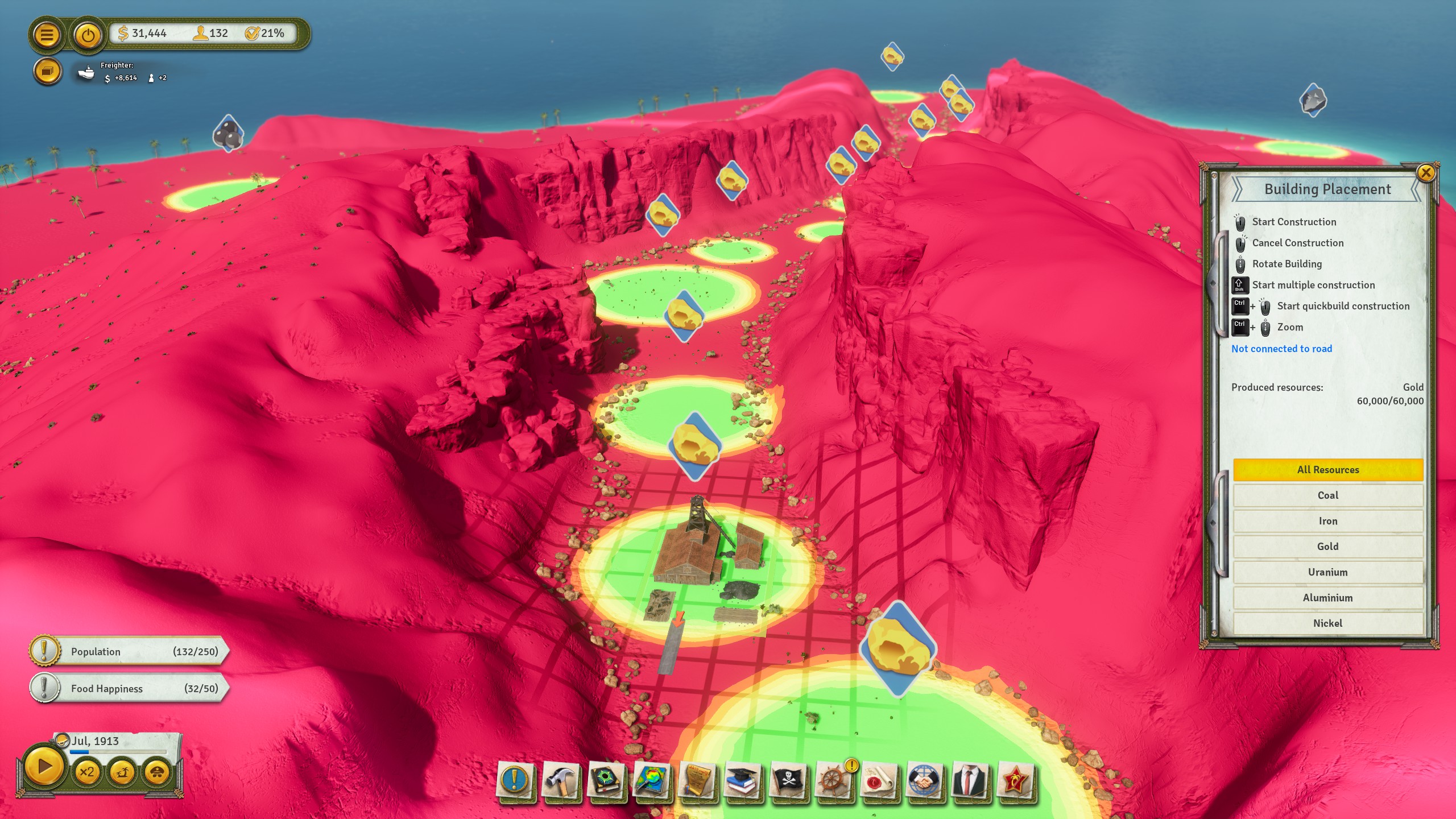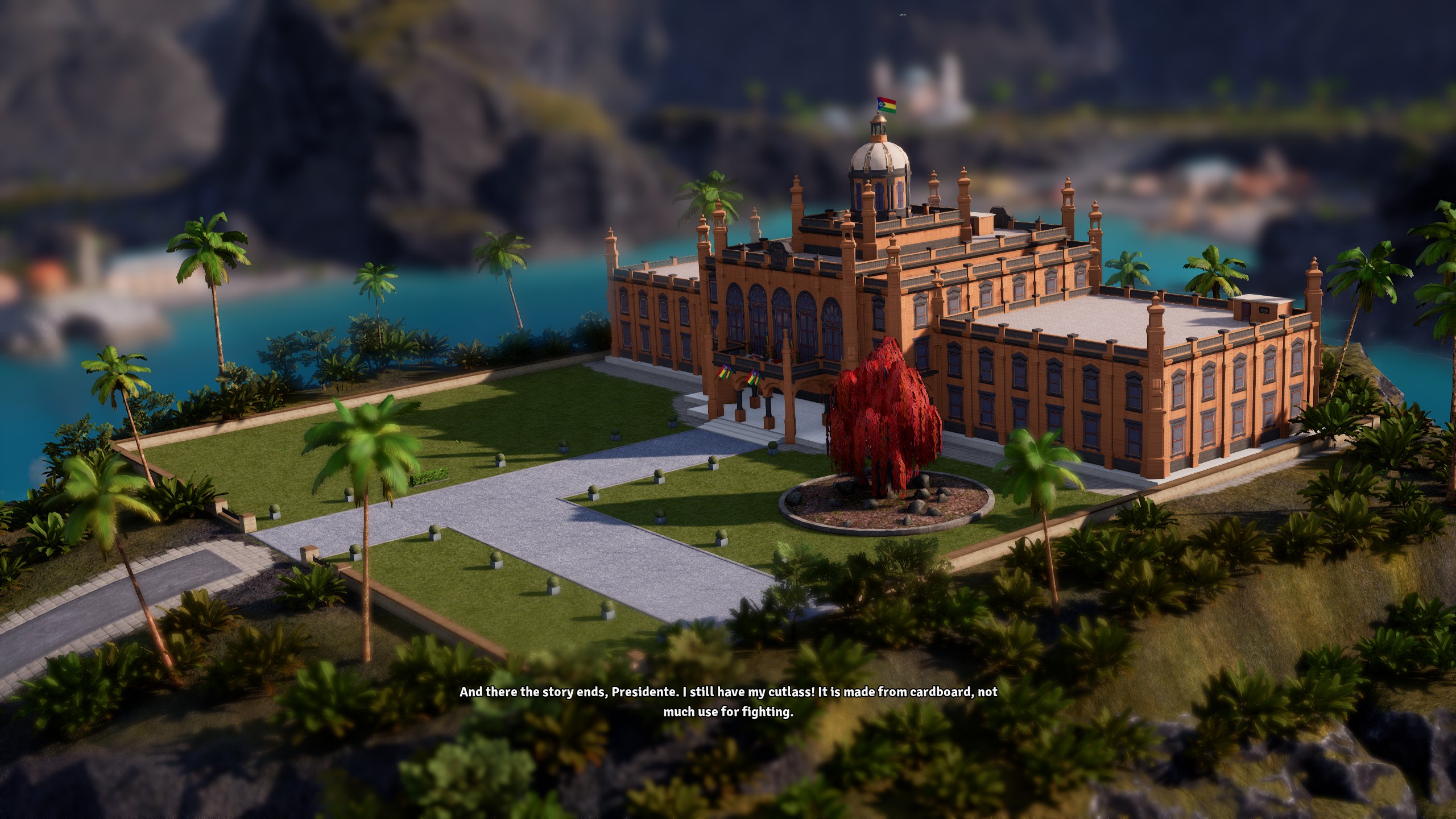Our Verdict
An entertaining but unambitious sequel that collects up the best features of previous games and adds in some interesting new twists.
PC Gamer's got your back
What is it? The latest in the city building series, now with a new developer at the helm.
Expect to pay: $50/£40
Developer: Limbic Entertainment
Publisher: Kalypso Media
Reviewed on: GeForce GTX 1070, 16GB RAM, i5-6600k
Multiplayer: Up to four players
Link: www.worldoftropico.com
Tropico 6 is a great game for people watching. It's a satirical city builder in which every one of the citizens of your banana republic is simulated. You place a mine. You watch as a construction crew makes its way over to the building site. You watch as the newly constructed mine's employees start digging for gold or coal or uranium or whatever. And you watch as teamsters come to take the raw materials to a factory for processing.
When it's all going well, there's a calming rhythm to the bustle of your island. When it's not, you find yourself scouring around the map, trying to diagnose problems. Why hasn't the mine been built? Why are the workers off-site? Why haven't the goods been transported? Why is the processing plant out of raw materials? Why isn't the shipment at the docks? The next cargo ship won't arrive for six months, and if I don't complete this trading order soon the Axis forces are going to declare war on me because of the time I used them as a scapegoat to win an election.
The focused, individualised simulation means that small inefficiencies can balloon into big problems, and the behaviour of your citizens feeds back into wider systems in interesting ways. That's why—while there is a sandbox mode with plenty of different islands and options—often the Tropico series is at its best during the campaign missions, where specific requirements force you to adapt.

In sandbox, you can go slow, sensibly growing your island, diligently pursuing new financial ventures, effectively placating political factions and superpowers. You have the space and freedom to effectively manage your growth as you progress through the different eras. But the missions – presented as an anthology of past adventures, narrated by your trusty aide Penultimo – throw in entertaining curveballs to overcome.
Each focuses on a different aspect of the game, be it the spread of propaganda, the challenges of mass tourism, the balancing act of international relations, or the benefits of light piracy. The latter is one of the most entertaining. Starting on an island with virtually no natural resources, you're required to pillage raw materials to then manufacture into more profitable goods. The raid system is a powerful new tool, essentially gifting a regular trickle of goods, immigrants and, in later eras, beneficial propaganda and even falsified tourist reviews. Having to create supply chains that aren't supported by local crops is a meaningful twist on a standard campaign.
If there's a downside to raids, it's that there's no major downside. Foreign powers have traditionally taken a dim view to piracy, but in this, a game that specifically pokes fun at international relations, it just doesn't come up. You do at least get a negative reputation modifier for stealing famed national monuments like Saint Basil's Cathedral or The /actual White House/, but it's easy to mitigate and goes entirely unremarked upon when said nation next gets in touch to demand you complete some petty task.

The only thing that can placate them? Building a golf course.
Some missions aren't as successful. One, in which El Presidente launches a grand experiment to abolish housing, sounded promising, but in practice just meant working around the negative opinion modifier that poor housing confers. Citizens can protest and even rebel, but, just like superpowers, they're too easy to placate—even when they don't have a roof over their head.
Where the missions excel, however, it's in forcing you to take actions that can upset the delicate balance of economic growth. If political strife always feels manageable, financial ruin is a more immediate danger, especially when progressing through to a new era. A few times I've gone from comfortable profit to uncontrollable decline, as upkeep and wages outgrew my production thanks to some ridiculous request from a faction leader.
Tonally, Tropico is almost too broad and bawdy to be considered satire, but the over-the-top absurdity does lead to some fun mission requests that feed comedy into mechanics. In one, for instance, the communists instruct me to dismantle religion, banks and mansions. This leads to outrage from the Capitalists. The only thing that can placate them? Building a golf course.

Tropico 6 was developed by new series stewards Limbic Entertainment, but you'd be hard pressed to know by just playing the game. It takes Tropico 5's era system, reintroduces Tropico 4's political speeches and work modes, and adds in a few new features designed to complicate supply chains and diversify systems. It looks a bit nicer – the Tropico series has always been very pretty – and the archipelagoes, bridges and tunnels add a few neat wrinkles to construction. That's about it.
Ultimately, this is still a series about people watching. The builder. The miner. The teamster. The factory worker. I've been watching these people perform the same tasks since I first encountered the series with Tropico 3. I'll probably watch them for many, many hours to come.
An entertaining but unambitious sequel that collects up the best features of previous games and adds in some interesting new twists.

Phil has been writing for PC Gamer for nearly a decade, starting out as a freelance writer covering everything from free games to MMOs. He eventually joined full-time as a news writer, before moving to the magazine to review immersive sims, RPGs and Hitman games. Now he leads PC Gamer's UK team, but still sometimes finds the time to write about his ongoing obsessions with Destiny 2, GTA Online and Apex Legends. When he's not levelling up battle passes, he's checking out the latest tactics game or dipping back into Guild Wars 2. He's largely responsible for the whole Tub Geralt thing, but still isn't sorry.


